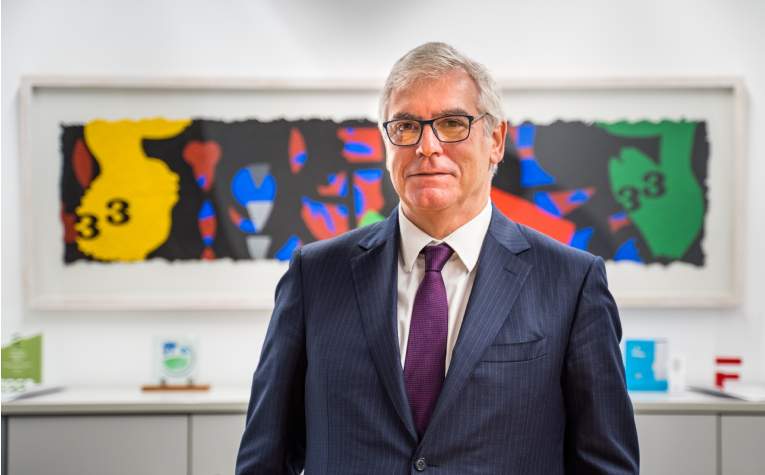1.The Andre Jordan Group is not only a reference it the real estate and tourism sector but also a model to be followed in respect to its environmental practice. When did this all start?
In 1970, when my father, Andre Jordan, bought Quinta dos Descabeçados, in the municipality of Loulé, Algarve, and what would become Quinta do Lago, he chose this land precisely because it would allow him to develop a project of high environmental sensitivity.
He states that the word “sustainability” was not widely used at the time, but he directed the plan with what he called “good sense and sensitivity”. And, 50 years later, the result is still extraordinary and a unique example in Europe and internationally.
His previous professional experience, together with his know-how in real estate development and urban planning, particularly his knowledge of the techniques of American “masterplanned communities”, allowed him to design a strategy of residential integration with the land and the surrounding nature in a harmonious way that respected the values of landscape and environmental preservation.
When I joined the organisation at the time of the acquisition of Lusotur SA in 1996, the challenge was equally enormous, but of a different nature, mainly in its environmental and residential component. It was a matter of introducing vast corrections to the existing urban plan, introducing – now yes – “sustainability” aiming for the long term in face of the very large dimension of the real estate development and the poor environmental and architectural performance of the already existing resort that had started in the 1960’s.
With thousands of houses and flats, dozens of hotels and tourist units, many businesses and service providers and a wide range of shops and restaurants, it was necessary to encourage thousands of stakeholders and to get them involved. One of the instruments I found was the development of the Environmental and Quality Management Systems in accordance with the ISO 14001 and ISO 9001 standards, achieving as of 1998 and in the following years and in a worldwide pioneering way, the certification of the golf courses, the Marina and the even the beaches. None of this had been achieved before.
A great many other numerous initiatives were also developed and implemented. Other certifications include Blue Flag for Beaches and Marina, Green Globe Destination Award, Committed to Green (specific for golf courses), and various awards and recognitions such as RICS, UN, Ford Foundation, European Commission, among many.
Our extensive action also served to motivate and sharpen the ambition of the other players to go beyond what they were doing and develop a strategy for environmental action.
2.You were responsible for the first “solar neighbourhood” with the objective to develop local energy production and matching consumption on a local scale. Is Portugal ready for such initiatives?
As for the new energy paradigms, Portugal is a particularly privileged country and therefore prepared from the point of view of “raw materials” (wind and sun), ie the necessary inputs. The long-distance transport of energy has a significant cost as well as a loss factor, so that the production of energy on a local, proximity or regional scale makes perfect sense, mainly associated with the respective consumption or necessity. New technological development allows management systems (micro-grids) to produce, inject, distribute, and consume efficiently and effectively photovoltaic electricity (smart grids).
It is within our reach to have solar neighbourhoods mainly in lower density residential areas and outside the densest centres. The concentrated urban area must be supplied with energy from renewable sources produced on a large scale, such as wind farms and large solar parks. Today these areas are supplied by fossil fuel power stations, which will have to be substantially discontinued in the coming decades. At Belas Clube de Campo we built the first Nearly ZEB houses in Portugal with the help of the technology developed by AMPERE and its batteries and smart systems; they were, and still are, a case of success and an example to be seen, contributing to the objectives of a reduced carbon footprint. These homes have many other environmental features incorporated in the design, construction and fit-out, shaping, in addition, a true net positive energy neighbourhood - NZEN.
3.In Portugal, energy poverty is a reality. Most of our homes are not prepared for very cold or very warm weather. What are the main obstacles and what can be done to overcome this?
Although understandable, the most adequate expression for energy poverty should be constructive poverty. In a general way, energy poverty defines the inability to ensure a comfortable temperature range inside the home or any other dwelling really. This is due to the poor or very poor quality of our constructions prevailing in 90% of the national residential stock, mainly before the 1990s. It is very clear that the reversal of this situation requires a broad renovation of the housing stock either by new construction or mainly by rehabilitation of the existing stock which requires an extra endeavour. This demands a true national challenge, very difficult and expensive to achieve, in which everyone must get involved: individuals, institutions, municipalities and the central administration. And there is no point in thinking about it in typical electoral cycles. This is a generational challenge.
4.For you what is “Beyond Green”?
To be Beyond Green is to have the ambition to achieve outcomes way above the status quo. It is the combination of hard work applying realism and pragmatism, and to find, develop and execute a strategy towards a positive value proposition of sustainability for the near, medium and long term - as one needs achievable goals along the way. It must move the individual, the public realm, the private business and above all, society in its broadest measure.
(1).jpg)
.png)

.jpg)
.jpg)
.jpg)